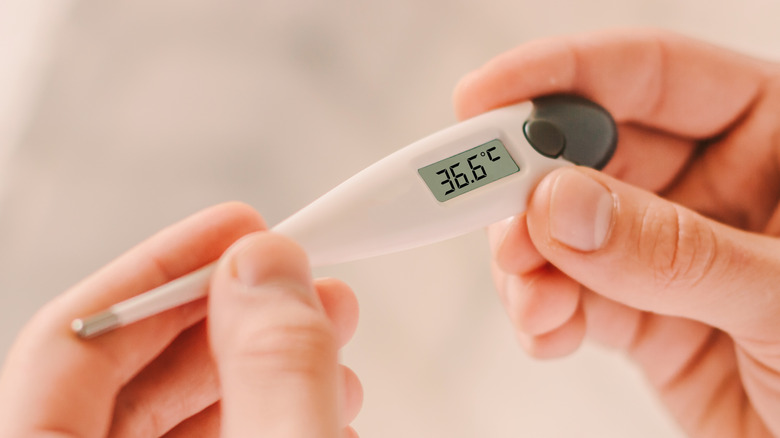How Your Body Temperature Changes As You Age
We've all reached for a thermometer when we feel feverish. We look for the telltale sign of a fever–anything higher than 98.6 degrees Fahrenheit. That's considered the average body temperature, right? Maybe.
According to Harvard Medical School, 98.6 degrees Fahrenheit was the average body temperature of a sample of 25,000 people in the mid-1800s. Since then, average body temperatures have been between 97.5 and 97.9 degrees Fahrenheit. A 2020 study in eLife found that men's body temperatures have dropped by .59 degrees Celsius (about 1.06 degrees Fahrenheit), and women's have dropped by .32 degrees Celsius (about .58 degrees Fahrenheit) since the 1800s. The researchers attributed the decrease in body temperatures to lower levels of population-level inflammation.
Normal body temperatures also change as we age. In a 2008 study in the Journal of Clinical Nursing, researchers measured the body temperatures of nursing home residents. They found that residents in the 65-74 age category had higher body temperatures compared to the 75-84 and 85 and older categories. The average body temperature decreased with each age category. The researchers also found that body temperature steadily increases during the day.
How temperature affects you
When it's hot outside, sweating is our body's temperature regulation system in action (per Columbine Health Systems Center for Healthy Aging). When we age, our ability to regulate our body temperature changes as our body fat and muscle mass change. This can make us more sensitive to fluctuations in temperatures in our surroundings (via Cleveland Clinic). When we're subjected to dangerously cold temperatures, our body's slowed response can be problematic. If our body temperature falls below 95 degrees Fahrenheit, we can be at risk of hypothermia. This puts extreme stress on the heart and nervous system (via Mayo Clinic).
However, feeling cold or hot despite normal temperatures could point to other health conditions. According to Orlando Health, feeling cold can signal anemia or hypothyroidism. Feeling hot can indicate hyperthyroidism or hormonal changes.
Even if our room or outside temperatures are normal, our body temperatures typically fluctuate throughout the day (per Oura). Although a fever above 100.4 degrees Fahrenheit is often a sign of infection, it can also indicate heat exhaustion, serious sunburn, or other medical conditions (via Banner Health). Low body temperatures can signal certain skin conditions, a vitamin B1 deficiency, or side effects from medication (per Livestrong).


